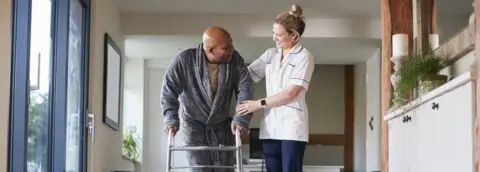Labour: Why would we oppose a social care tax?
Labour would not oppose a tax to cover social care costs if the money was guaranteed for care, says shadow health secretary Jonathan Ashworth.
Asked about reports the government could introduce a tax as part of its reforms, he said: "Why would we oppose that when we want to see more money going into health and social care?"
But his party leader, Sir Keir Starmer, would not say if he supported a tax.
Housing Secretary Robert Jenrick said a plan would be announced "quite soon".
Boris Johnson pledged to "fix the crisis in social care once and for all with a clear plan we have prepared" when he became prime minister in 2019 - but the detail has yet to be published.
Newspaper reports suggest it could involve introducing a tax to fund the reforms, but the Conservatives pledged not to raise taxes in their 2019 election manifesto.
Former health secretary Jeremy Hunt said it was "very urgent" to fix the problems in England's social care system, telling BBC Radio 4's The World This Weekend: "It is now or never."
The government has said it would bring forward its plan by the end of the year.
Mr Ashworth told the BBC's Andrew Marr: "We obviously have to pay for social care and if the government is going to put forward a tax rise for social care, I think they would need to guarantee that the yield from that tax rise is hypothecated for health and social care.
"We know that Rishi Sunak is a tax-rising chancellor, he wants to put up taxes on hard-working families, so he's need to ensure, to guarantee, that everything that comes from that tax rise goes into health and social care."
Mr Ashworth also called for wider reforms to the "quality" and availability of social care, as well as a pay rise for care workers.
"We need more than these 15 minute visits," he said. "We have got one in six care homes considered inadequate by the CQC [Care Quality Commission] and we need to pay the staff properly, so we need a comprehensive package."
But asked later by reporters if he would support a tax, Sir Keir said the "first and most important thing is the key principles" of social care, one of which was being able to get care at home.
Pushed again over his opinion on such a policy, the Labour leader said: "Of course whatever is put in place will have to be paid for and when we go into the... next election, we will have a fully costed manifesto, including the cost of social care.
"We will have a fully costed manifesto, we will set out our plans for social care and they will be costed so everyone can see how we are going to pay for them."
'Now or never'
Mr Hunt, who is now the chair of the health select committee in Parliament, said there was a cross-party consensus on fixing social care.
But he told The World This Weekend it could cost between £7bn and £10bn every year, adding: "That is the kind of sum of money that can't really be found down the back of a sofa by a chancellor."
To fund it, he said "you are really talking about either tax rises or having to cut spending in other areas", and tax was the "most progressive way".
Mr Hunt added: "If you have a social care system that is broken it will export our most vulnerable people into hospitals. So I think we have to be honest, we will not fix the problems in the NHS until we bite the bullet on social care.
"I think if it hadn't been for the pandemic [and] the fall of Theresa May's government because of the issues around Brexit, we would have had a solution sooner. But now we have got to this point, it really is now or never."

Why is social care a problem?
 Getty Images
Getty ImagesThe deputy director of policy at the Nuffield Trust, Natasha Curry, said the social care system in England is "very difficult to understand" and "very difficult for people to negotiate".
She told The World This Weekend that anyone with property, income or savings above £23,250 has to pay for all their care costs.
On top of that, councils who provide the care have seen their budgets cut "severely" over the last decade, meaning while there is a growing need for care, the money isn't available for the services.
Ms Curry also said there are millions of people providing unpaid care for loved ones, and the 1.5 million people who work in the sector are "underpaid and undervalued", with about a quarter of them on zero hours contracts.

Mr Jenrick - who is the cabinet minister for local government - was also asked by Andrew Marr if he would support a tax to support social care costs.
He said the government was "working through the options" and he recognised the "stresses and strains on councils" who provided care.
But he would not say if he supported a tax, instead adding: "I am working very closely with the health secretary and the chancellor, and indeed the prime minister, to bring forward our proposals and I expect that they will be presented quite soon."
